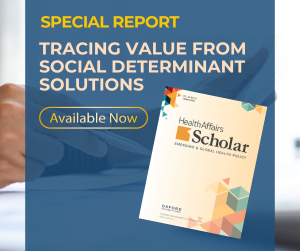
CHMRC is proud to have funded a groundbreaking study published in Health Affairs Scholar by the Urban Institute’s Health Policy Center, titled Tracing Value from Social Determinant Solutions. This research directly aligns with CHMRC’s mission to foster community resilience and promote health equity by addressing the root causes of health disparities. By focusing on interventions that tackle homelessness, food insecurity, and barriers to healthcare, the study reinforces our commitment to building stronger, healthier communities. Through the introduction of a comprehensive framework to trace value across health, cost and quality, engagement, and equity, this work provides a roadmap for empowering local coalitions and shaping equitable policies. It underscores the importance of investing in upstream solutions to create lasting impact, reflecting CHMRC’s vision of a resilient future for all.
Tracing value from social determinant solutions
Health Affairs Scholar, 2024, 1(1), qxae173
https://doi.org/10.1093/haschl/qxae173
Advance access publication: December 19, 2024
Len M. Nichols, Timothy A. Waidman , Lisa Clemans-Cope , Bowen Garrett , Kima Taylor
Urban Institute, Health Policy Center
CONTEXT
Recent policy changes (penalties for hospitals with too many readmissions, health insurance coverage expansions) and events (e.g., opioid crisis, COVID, racial justice protests) have intensified health care organizations’ interest in social determinants of health (SDOH). Hospitals, health plans, community-based organizations and policy makers are asking themselves, what can we do upstream of health care that might make a difference and which interventions might pay for themselves?
WHY THIS MATTERS
We welcome the promising actions these questions have spurred, but we note the scale of unmet human needs in the United States is far beyond what a narrow focus on individually defined “health-related social needs” can address. In this paper therefore we ask a different set of questions: what would it be worth to END homelessness? To END Food Insecurity and Economic Insecurity, to ELIMINATE barriers to access to physical and mental health care? Our questions may sound utopian, but answering them as rigorously as possible today may also help reframe the actionable policy debate on social determinants of health (SDOH) investments in productive ways, as well as provide guideposts for communities trying to improve health equity in the near term.
WHAT WE DID AND HOW WE DID IT
We develop and illustrate a framework to trace value from social determinants of health (SDOH) interventions across 4 dimensions: health, cost and quality, engagement, and equity. To provide context, we begin by estimating the societal value lost to premature deaths from homelessness and food insecurity, using recent longitudinal methods that offer greater precision. We then apply the value tracing framework to 2 example interventions: permanent supportive housing for chronically homeless people and medically tailored meals for dual eligibles. These examples are supported by a narrative review of relevant literature, highlighting evidence from high-quality studies of SDOH projects that often show a broader range of benefits to multiple stakeholders. Prior research frequently overlooks non-healthcare savings, concluding that interventions “don’t pay for themselves.” In contrast, our findings show that when all beneficiaries are considered, many SDOH interventions yield a net positive value. Recognizing the public good nature of SDOH interventions is essential for reaching accurate policy conclusions. This paper advocates for greater recognition and estimation of the multiple sources of value to be reflected in payment policies and investment decisions. Additional SDOH interventions and practical examples for local coalitions are provided in appendices.

 The Bloomerang Network
The Bloomerang Network
